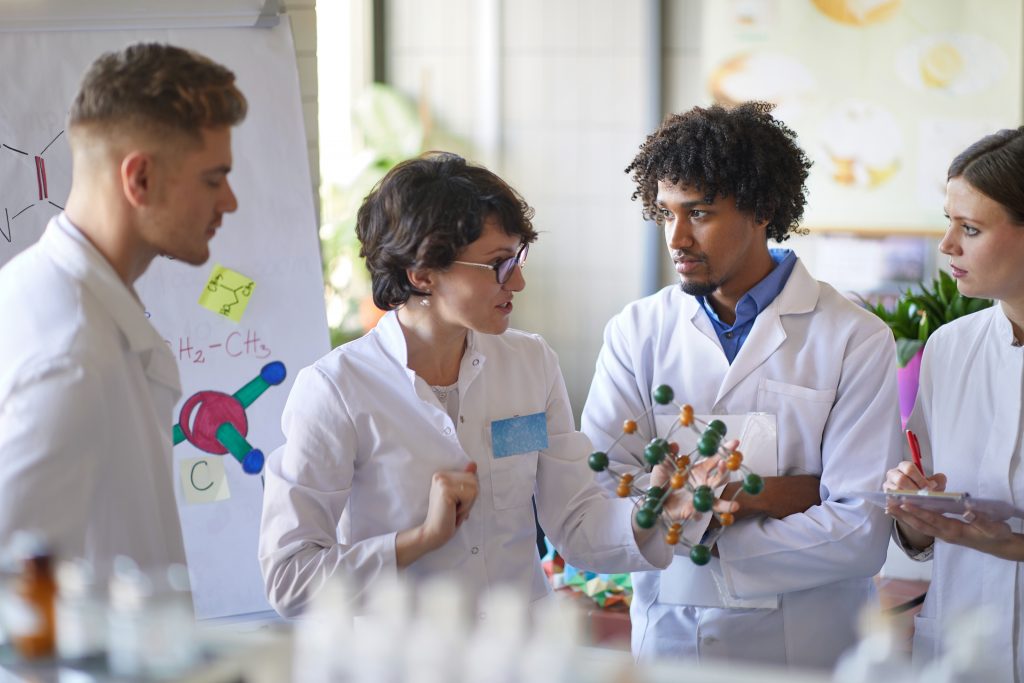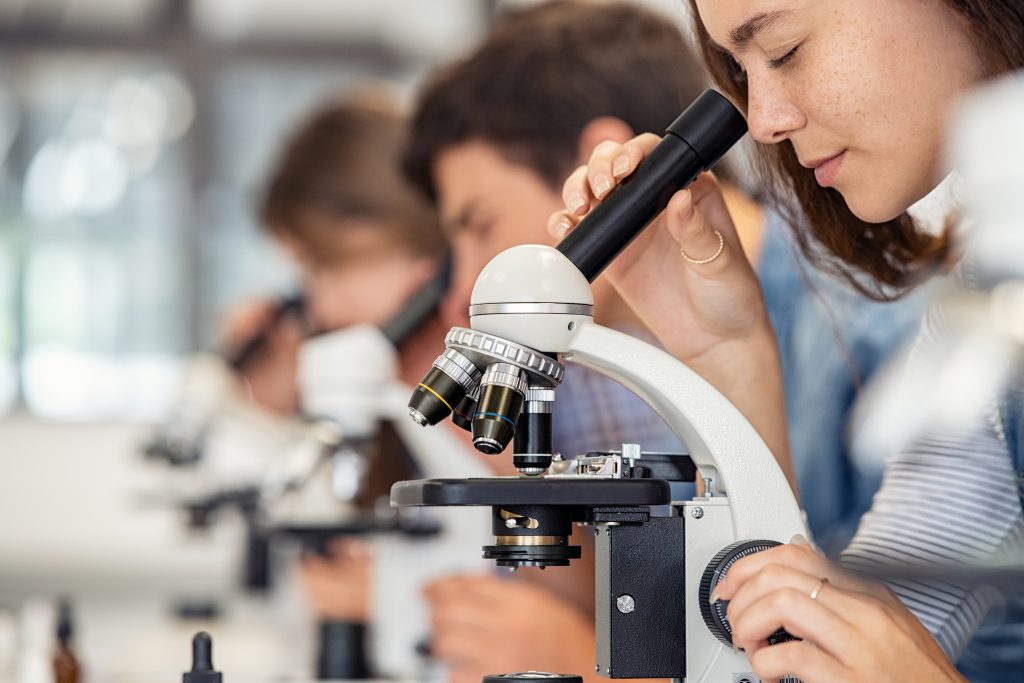Strong analytical skills and a desire to work in healthcare can lead to a career in pharmacy. But to become a pharmacist you need the right pharmacy education. You can’t dispense drugs, give medical advice, or administer vaccines without a pharmacist degree.
In this article, we discuss what it takes to become a pharmacist. We answer questions like:
- What major do you need to be a pharmacist?
- What degree does a pharmacist need?
- How much money you can make as a pharmacist?
- What the job outlook is for pharmacists, aspiring pharmacy technicians, and other healthcare providers?
Read on for more information on what to major in to be a pharmacist and the best degrees for pharmacist jobs.
What is a Pharmacist?
Pharmacists are healthcare professionals. They fill and dispense medication prescribed by doctors to patients. They consult and advise patients on the safe use of prescription drugs.
To work as a pharmacist, you must earn a professional degree from an accredited program. Pharmacy education includes an undergraduate degree, pharmacy school, and a Pharm.D. degree. This advanced degree is in pharmacology.
So, what is pharmacology? Pharmacology is the study of chemicals and drugs and how they impact living organisms. A PharmD program introduces pharmacy students to different properties of medications. It covers both positive and negative effects of drugs. Because pharmacy programs cover biochemistry and medical sciences, as well as pharmacology, pharmacy graduates can work in many different fields and roles.
Pharmacy Career – Types of Jobs
Pharmacy originates from Greek and Roman mythology. It has grown from plants, herbs, mortar, and pestle into a dynamic and modern profession. There are over 150 accredited pharmacy schools in the United States. You need a degree for pharmacist jobs. But once you’ve completed your degree to be a pharmacist or pharmacy technician, there are different job types available.
Clinical Pharmacist
This pharmacist works in a doctor’s office, hospital, or other healthcare setting. Instead of dispensing medications like pharmacy technicians, they make rounds at hospitals and work with patients. They oversee dosages and medications. They spend most of their time counseling patients on new medications and providing patient care.
Community Pharmacist
Community pharmacists work in retail chain drug stores like CVS, Target, and Walgreens. They also work in private own pharmacies. They dispense medication and answer questions patients have about prescriptions. They also administer shots and vaccines. Some community pharmacists work in public health.
Consultant Pharmacist
Consultant pharmacists provide consulting services to healthcare facilities and insurance providers. They discuss ways to improve pharmacy services. They also offer advice on patient medication. Some consultant pharmacists work directly with senior patients. They provide advice on how to manage their prescriptions.
Nuclear Pharmacist
Nuclear pharmacists are among the highest-paid pharmacists. They work in labs, preparing radioactive materials used to diagnose and treat diseases through nuclear medicine. There are few pharmacy technician jobs in nuclear pharmacy. This field hires pharmacists with pharmacy school background.
Pharmaceutical Pharmacist
You find pharmaceutical pharmacists in the pharmaceutical industry. They conduct clinical trials and help develop new drugs. They also establish safety regulations and provide quality control. You do not find this type of pharmacist working in retail pharmacy. They work in pharmaceuticals.
Pharmacy Technician
Pharmacy technicians receive a different pharmacy education than pharmacists. They don’t go to school as long as pharmacists do, but pharmacy assistants and pharmacy techs fill prescriptions and assist pharmacists in many tasks. Their responsibilities require specialized training in medication therapy and drug knowledge.
Professor of Pharmacy
With a bachelor’s degree in pharmaceutical sciences and the completion of a PharmD program, you can become a college professor. Many pharmacists get jobs as professors teaching a new generation of pharmacists. In academia, pharmacy professors also work on research and pursue publication. But you must have a Doctor of Pharmacy degree to qualify for work as a professor.
What to Major in to Become a Pharmacist
Undergraduate coursework matters as you prepare for pharmacy school or jobs as pharmacy assistants or a pharmacy tech. Once you have a high school diploma or certificate or associate degree, it’s time to consider your pharmacist major. What do you major in to become a pharmacist? There are different paths to choose from.
Pharmaceutical Sciences
There are many majors to be a pharmacist. But the most common is pharmaceutical sciences. Most pharmacy schools look for candidates with a strong background in:
- Biology
- Chemistry
- Physics
You can also major in any of the above subjects if your school doesn’t have a pharmaceutical science major. But undergraduate pharmacy degrees can provide more specific courses that will help you with the pharmacy college admission test. A pharmaceutical science program covers pharmacology courses and pharmaceutics topics that are helpful for pharmacy school.
Now that you know what should you major in to become a pharmacist, it’s time to look at pharmacy school and the degree you need for a pharmacist career. Read on for more information on the PharmD degree (pharmacists degree) that will land you a job as a pharmacist.
The PharmD Degree
Aspiring pharmacists spend about six years in school before going to work as a pharmacist. They need pharmacy education, which includes a Doctor of Pharmacy or PharmD degree. Pharmacy programs take four years to complete. But students must also complete at least two years of undergraduate college education before they are eligible for a PharmD program.
In some pharmacy degrees or programs, prospective students earn a bachelor’s degree in a subject such as:
- Anatomy
- Biology
- Chemistry
- Pre-pharmacy
They also take an examination called the Pharmacy College Admission Test (PCAT). After this exam comes the Multistate Pharmacy Jurisprudence Exam, which we explain later in this article. There are also some six-year Doctor of Pharmacy programs. These programs accept students with no college credits but with a high school diploma.
Importance of an Accredited Pharmacy Program
The Accreditation Council for Pharmacy Education (ACPE) accredits over 100 Doctor of Pharmacy degree programs in the United States. If you want a successful pharmacy career, plan on attending an accredited pharmacy school. Even an aspiring pharmacy technician or pharmacy assistant should attend only programs that have received accreditation council approval.
ACPE accreditation council programs adhere to national standards. They ensure students receive proper curriculum and gain knowledge in areas like:
- Disease management
- Drug absorption rates
- Medical ethics
- Patient care
- Pharmacology
- Toxicology
Completing an accredited PharmD program helps students land jobs in hospital pharmacies, pharmaceutical companies, and retail pharmacies.
PharmD Concentrations
Many pharmacy schools offer concentrations to PharmD students. A concentration helps you tailor your degree toward an area of interest. You can take extra classes and gain knowledge in a specific area of study, such as pharmacy education or osteopathic medicine. Here are a few popular concentrations you can find in a pharmacy program.
Education
An education pharmacy program concentration prepares students as pharmacy educators. This is a good concentration for students seeking leadership and educator roles in pharmaceutical organizations and other healthcare settings.
Health Systems
This concentration focuses on policies and structures used in healthcare systems. You learn how processes work and how to improve them. Some programs also focus on management technologies in health systems.
Public Health
A public health concentration focuses on population-based healthcare. It teaches prospective pharmacists how to test community health programs. You also learn about disaster preparednesses and large-scale vaccination programs.
Licensing and Training
Pharmacists need a license to work in the United States, according to the Bureau of Labor Statistics (BLS). Sure, you need a Doctor of Pharmacy degree (PharmD), but you must also pass two exams. These exams help you gain the licenses you need after you finish your pharmacist programs.
The first exam you take is the North American Pharmacist Licensure Exam (NAPLEX). This exam covers general practical knowledge you learned in pharmacy school. The second exam is the Multistate Pharmacy Jurisprudence Examination. This exam covers laws and regulations in everything from public health to retail pharmacy.
Some pharmacists want to work in advanced research or clinical pharmacy positions. If you want to advance, you should consider completing a residency experience. Residencies can last one to two years. You can also earn a certification from the Board of Pharmacy Specialties if you want to work in a specialized field of pharmacy.
How Much Money Pharmacists Make
Aspiring pharmacists should consider the pay before researching pharmacy schools. It is important to know how much money you can make after earning your pharmacy degrees.
According to the accreditation council and Bureau of Labor Statistics (Occupational Outlook Handbook), the average pay for pharmacists is $128,570/year. The lowest 10% of workers in this occupation earn less than $77,000/year. But the highest 10% of earners make over $164,000/year.
Certain factors impact earnings. Where you work, experience, and industry type can all make a difference in your pay. In this section, we take a look at how geographic location and industry type impact earnings for pharmacists.
High Paying Industries for Pharmacists
There are four industries that offer pharmacists the best pay out of college. Pharmacy technicians also earn good wages in these industries. High-paying industries include:
- Ambulatory healthcare services: $131,790/year
- Hospitals: $130,280/year
- Food and beverage stores: $128,190/year
- Pharmacies and drug stores: $127,820/year
High-Paying States for Pharmacists
Geographic location also impacts earnings for pharmacists. According to the Occupational Employment and Wage Statistics data published by the BLS, certain states and cities offer high wages. There are five top-paying states for pharmacists. These include:
- California: $146,140/year
- Alaska: $145,910/year
- Oregon: $136,520/year
- Washington: $134,290/year
- Vermont: $130,460/year
High-Paying Cities for Pharmacists
Certain metropolitan areas also offer high wages for pharmacists. According to the BLS, the highest-paying metro areas for pharmacists are in California.
- San Jose, Sunnyvale, Santa Clara: $168,640/year
- San Francisco, Oakland, Hayward: $163,840/year
- Santa Rosa: $158,420/year
- Vallejo, Fairfield: $156,850/year
- Santa Cruz, Watsonville: $152,770/year
There are non-metro areas that also offer above-average earnings for a pharmacist, pharmacy assistant, or pharmacy technician. You don’t have to live in metro areas to earn good wages. The top non-metro areas include:
- Kansas nonmetropolitan area: $120,630/year
- Balance of Lower Peninsula of Michigan non-metro area: $122,700/year
- North Northeastern Ohio non-metro area: $117,330/year
Job Outlook for Pharmacists
Now that you’ve answered the question what major should I choose to be a pharmacist, you can consider the job outlook for this career. In recent years, job growth for pharmacists has shown a decline. But in the last year, a 2% increase occurred. According to the BLS, job growth for pharmacists is 2% through 2030.
Despite the slow growth, 13,600 job openings for pharmacists should result each year, over the next decade. Since that number isn’t huge, candidates will face competition.
Certain industries will experience job growth, while others will see a decline. The BLS anticipates job loss for pharmacists working in retail pharmacies and drug stores. This loss is due to the growing number of people filling their prescriptions online or via mail order.
Over the next several years, we will also see pharmacy technicians replacing pharmacists in retail chains. A pharmacy technician carries out many of the same tasks that a pharmacist does, but at a lower cost.
But job growth for pharmacists will occur in some healthcare settings. The BLS expects employment growth in:
- Clinics
- Doctor offices
- Hospitals
Pharmacy Industry Outlook
A growing number of patients admitted to hospitals and treated by doctors demands more pharmacists. These healthcare areas rely on pharmacists to administer drugs and medication to patients. These facilities are also good places for an aspiring pharmacy technician to find work.
According to the BLS, pharmacists held 323,500 jobs last year. The largest employers of pharmacists are:
- Pharmacies and drug stores
- Hospitals
- Food and beverage stores
- Ambulatory healthcare services
The largest employer of pharmacists is pharmacies and drug stores. They employ about 40% of all pharmacists. Hospitals at the local, state, and private levels are the second-largest employer of pharmacists. They hire about 27% of pharmacists.
Important Qualities Pharmacists Should Have
The job of a pharmacist requires unique skills, but they aren’t always taught in the classroom. Certain skills and qualities develop over time. You learn them on the job and with experience. Here are some important qualities every pharmacist or pharmacy tech should have.
Ability to Lead a Team
Leadership and managerial skills are important for pharmacists. A pharmacist or pharmacy technician working in retail pharmacy oversees staff members and manages inventory. They are the lead in patient care and should have strong leadership skills.
Analytical Skills
Analytical skills are important for pharmacists. The job demands deep knowledge of:
- Drug interactions
- Drug safety
- Administration of different types of medication
Detail-Oriented
A pharmacist must pay attention to details. It is the details that help them know when to administer drugs, make changes, and advise patients. Accuracy is important.
Pharmacists must make decisions based on literature and research. They must also:
- Fill prescriptions
- Identify health risks associated with medications
- Note important drug interactions
Effective Communication Skills
Pharmacists interact with the public. They advise, consult, and explain. They need good communication skills to:
- Explain possible side effects and drug interactions to patients
- Explain processing insurance claims to patients and staff
- Provide instruction to pharmacy technicians and interns
- Tell patients how a specific medication works
To carry out these tasks, pharmacists must communicate in an effective way.
Technological Skills
To access electronic health records, computer and technological skills are necessary for pharmacists. Pharmacists use computers and technology to:
- Look for drug interactions
- Research literature
- Track important criteria
BDP Staff
May 2023
Related Resources:
- 20 Most Affordable Bachelor’s in Healthcare Administration Degrees Online
- 20 Most Affordable Master’s In Nursing Leadership and Nurse Administration Online
- 30 Best Online Bachelor’s in Healthcare Administration
- 30 Best Online Bachelor’s in Health Sciences and Nutrition
- Ultimate Guide to Nursing & Healthcare Degrees and Careers




